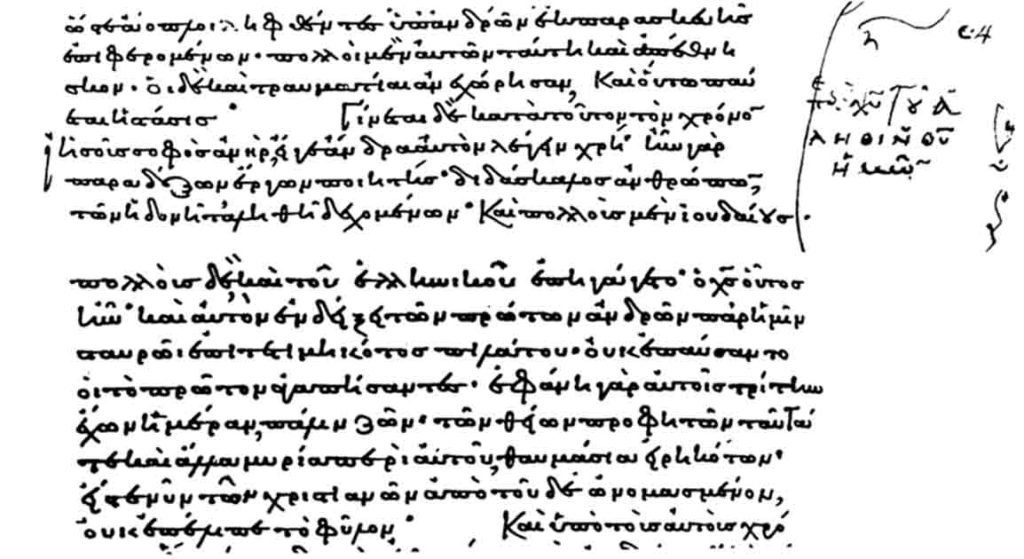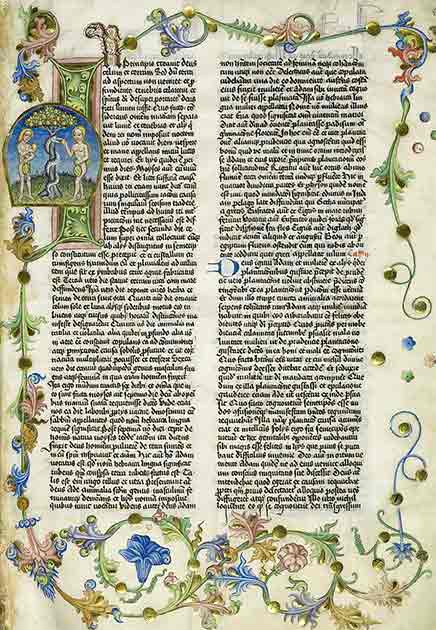One of the key debates surrounding the story of Jesus is who he was as a historical figure. Putting aside who he said he was, or the things of which he was said to be capable, placing this person within the historical record can go a long way towards understanding his actions, his motivations, and what made him so special.
Extra-biblical references to this figure are obviously very important: nobody would dispute that the people who wrote the New Testament of the Bible are firmly in the pro-Jesus camp. But, unsurprisingly, useful information on a figure who only became widely significant following his death 2,000 years ago is hard to come by.
This is what makes the Testimonium Flavianum so important. This passage, found in the works of the Jewish historian Flavius Josephus, has long been a subject of scholarly debate.
This controversial passage nestled within Josephus’s Antiquities of the Jews provides a brief account of Jesus of Nazareth and his followers. Its significance lies in its potential validation of Jesus’s existence and teachings by a non-Christian author.
However, questions about its authenticity have persisted for centuries, sparking discussions about whether it represents historical truth, a complete fabrication, or a blend of both. By taking a look at its origins, importance, and the conflicting viewpoints surrounding its authenticity is it possible to answer this question?
The Controversy
The Testimonium Flavianum can be found in Flavius Josephus’s Antiquities of the Jews. The author, born Yosef ben Matityahu, was a first-century AD Jewish historian and scholar and his text was a comprehensive historical work chronicling Jewish history from the creation of the world up to the Jewish War in the first century AD.
The primary passage we’re talking about today is found in Book 18, Chapter 3, Paragraph 3, and refers to Jesus of Nazareth and provides a brief description of his life, teachings, death, and the general rise of Christianity. Other important passages in the Testimonium Flavianum make mention of Jesus’s brother, referred to as James (Book 20, Chapter 9), and the imprisonment and death of John the Baptist (book 18, chapter 5).

In Book 18 Josephus describes Jesus in a flattering light, calling him a “wise man” who performed “wonderful works” which attracted followers from both the Jewish and Gentile communities. Surprisingly for a Jewish historian, he also describes Jesus as the “Christ” (aka Messiah) and tells the story of his martyrdom at the hands of the Roman governor Pontius Pilate.
He even goes as far as covering Jesus’s resurrection, citing it as a fulfillment of prophecy and the origin of the Christian movement. These are strong words coming from a Jewish source, a ringing endorsement of the divinity of Jesus as some have argued.
For such a historically important text the Testimonium is surprisingly brief. It is only one paragraph long, and depending on the translation is generally around 127 to 176 words in English translations. Despite this, it has garnered significant attention due to its potential significance for understanding the historical Jesus. This importance stems from a couple of key factors.
- Swoon or Substitute? Two Rationalizations of the Resurrection of Jesus
- Apollonius of Tyana Similarities to Jesus Christ
Most importantly, the Testimonium Flavianum is simply one of the earliest non-Christian references to Jesus. Josephus was a Jewish historian writing in the first century AD and his work (if legitimate) offers insights into how non-Christian contemporaries perceived Jesus.
The fact Josephus was Jewish but depicts Jesus in a positive light is particularly interesting, considering how antagonistic the relationship between the two groups could be. But this source is important simply for offering a near-contemporary confirmation that Jesus existed at all.
Secondly, the passage contributes to our understanding of the historical context in which Jesus lived. By mentioning Pontius Pilate, the Roman governor who ordered Jesus’s crucifixion, and referencing the Jewish leaders who opposed Jesus, the Testimonium Flavianum provides context for Jesus’s trial and execution within the political and religious landscape of first-century Judea.
While this information was often recorded by Christian scholars it is interesting to see a Jewish historian’s perspective within the Testimonium Flavianum. Josephus was also somewhat Romanized, and his writings offer a perspective from the occupying Romans as well.

This all being said, the importance of the Testimonium Flavianum is tempered by the ongoing debate surrounding its authenticity. While some scholars view it as a valuable historical source, others question its reliability due to potential later Christian interpolations or alterations.
If it is real, then we have a non-Christian calling Jesus the “Messiah” at a time only a few decades after his death. If fake, it undermines the entire existence of Jesus as a historic figure as we have precious little evidence elsewhere to support this. Understanding the arguments surrounding the text is vital to understanding its importance.
Arguments in Favor
For many centuries, the arguments against the text’s validity outweighed the arguments for it: it was simply too convenient. However, during the 20th century, scholars began to change their tune and became more open-minded to the idea that the text could be genuine. They point to several factors supporting its credibility.
For a start, proponents have argued that Flavius Josephus is recognized as an otherwise meticulous historian who tended to accurately report remarkable events and figures of his time. It seems unlikely that he would falsify claims about Jesus. They contend that Josephus’s mention of Jesus aligns with his broader historical methodology of documenting noteworthy individuals and movements.
Secondly, supporters highlight the corroborating evidence provided by other ancient sources. Although the Testimonium Flavianum is one of the earliest non-Christian references to Jesus, its basic elements parallel aspects of the New Testament accounts and later Christian writings.
This consistency, they argue, lends credence to the core historical details preserved in Josephus’s passage. Just because the Bible is biased does not mean that everything in the New Testament is a fiction.
Additionally, proponents point to the presence of early manuscripts containing the Testimonium Flavianum, which suggests that the passage was part of Josephus’s original work. While variations exist among manuscript versions, the overall consistency of the passage across different textual traditions suggests a common source rooted in Josephus’s writings.
Furthermore, proponents argue that Josephus’s Jewish background and lack of allegiance to Christianity lend credibility to his account of Jesus. As a non-Christian Jew writing for a predominantly Jewish audience, Josephus would have had no personal stake in promoting Christian beliefs or exaggerating the significance of Jesus.
Unfortunately this last argument neglects to mention how inherently weird it is that a Jewish historian of the period had so many nice things to say about Jesus. And, if you think about it, creating a fake account of Jesus and putting it in the writings of a Jewish historian is exactly what early Christians would look to do to lend credibility to their fledgling religion.
- Rejecting the Gospels: the Toledot Yeshu and the Sorcerer Jesus
- Land of the Rising Sun: Did Jesus Retire To Rural Japan?
Overall, proponents of the Testimonium Flavianum being true contend that while the passage may have undergone some later Christian interpolation or embellishment, its core elements likely reflect an authentic historical testimony to the existence of Jesus of Nazareth.
Arguments Against
While some scholars advocate for the authenticity of the Testimonium Flavianum, others raise compelling arguments suggesting that the passage is either entirely fabricated or contains significant interpolations.

One of the oldest, and strongest, arguments against the Testimonium Flavianum’s legitimacy is how awkwardly it sticks out thanks to its abrupt insertion within the broader narrative of Josephus’s Antiquities of the Jews. Its style and content just don’t seem to match the writer’s typically objective and critical approach to historical events.
There’s also the fact that Josephus was a devout Jew who never embraced Christianity. This means it’s deeply unlikely he’d ever endorse Jesus as the Messiah or affirm the resurrection.
It’s one of the key differences between Christianity and Judaism. It would be like a Muslim, Buddhist, or Hindu recognizing Christ as the savior, and for Josephus to describe Christ this way is to suggest he was a convert to Christianity, something for which there is zero additional evidence (and plenty of counter-evidence).
Skeptics have also pointed out there are no references to Josephus writing about Jesus prior to the fourth century. Early Christians like Origen and Eusebius, both of whom loved to quote the Jewish historian, never mentioned the Testimonium Flavianum.
This raises doubts about the passage’s authenticity and suggests that it may have been inserted or substantially altered at a later date to bolster Christian claims about Jesus. And with this suggestion we strike at what many think actually happened here.

Textual analysis of the Testimonium Flavianum reveals inconsistencies and discrepancies across different manuscript versions. Variations in wording and placement within the text indicate that the passage may have undergone alterations over time, further undermining its credibility as an authentic historical account.
Simply put, Josephus may have written the original Testimonium Flavianum as a passing reference to a preacher and his followers. Then, in the decades and centuries following this passage may have been altered and embellished with blank phrases such as “He was the Christ” inserted to give legitimacy to Jesus and his religion.
The debate surrounding the Testimonium Flavianum is likely to go on for some time. While some scholars uphold the passage as a valuable historical source affirming the existence of Jesus of Nazareth, others remain skeptical of its authenticity, citing inconsistencies, and theological biases.
It perfectly encapsulates the complexity of historical inquiry and the challenges of interpreting ancient texts- you never know who or what you can trust. Whether or not the text is real, fake, or somewhere in between one thing remains certain: the quest to uncover the truth about Jesus of Nazareth will persist.
But one thing should be remembered as well. Ultimately from one angle it doesn’t really matter if the Testimonium Flavianum is real or fake: in either case it can tell us something about early characterizations of Jesus, either from the eyes of a Jew or at the hand of fraudulent early Christians.
Top Image: The Testimonium Flavianum appears to be an endorsement of Jesus as the “Christ” but that is a very strange thing for a Jewish author to write. Source: Dr.hhorn / CC BY-SA 4.0.
By Robbie Mitchell